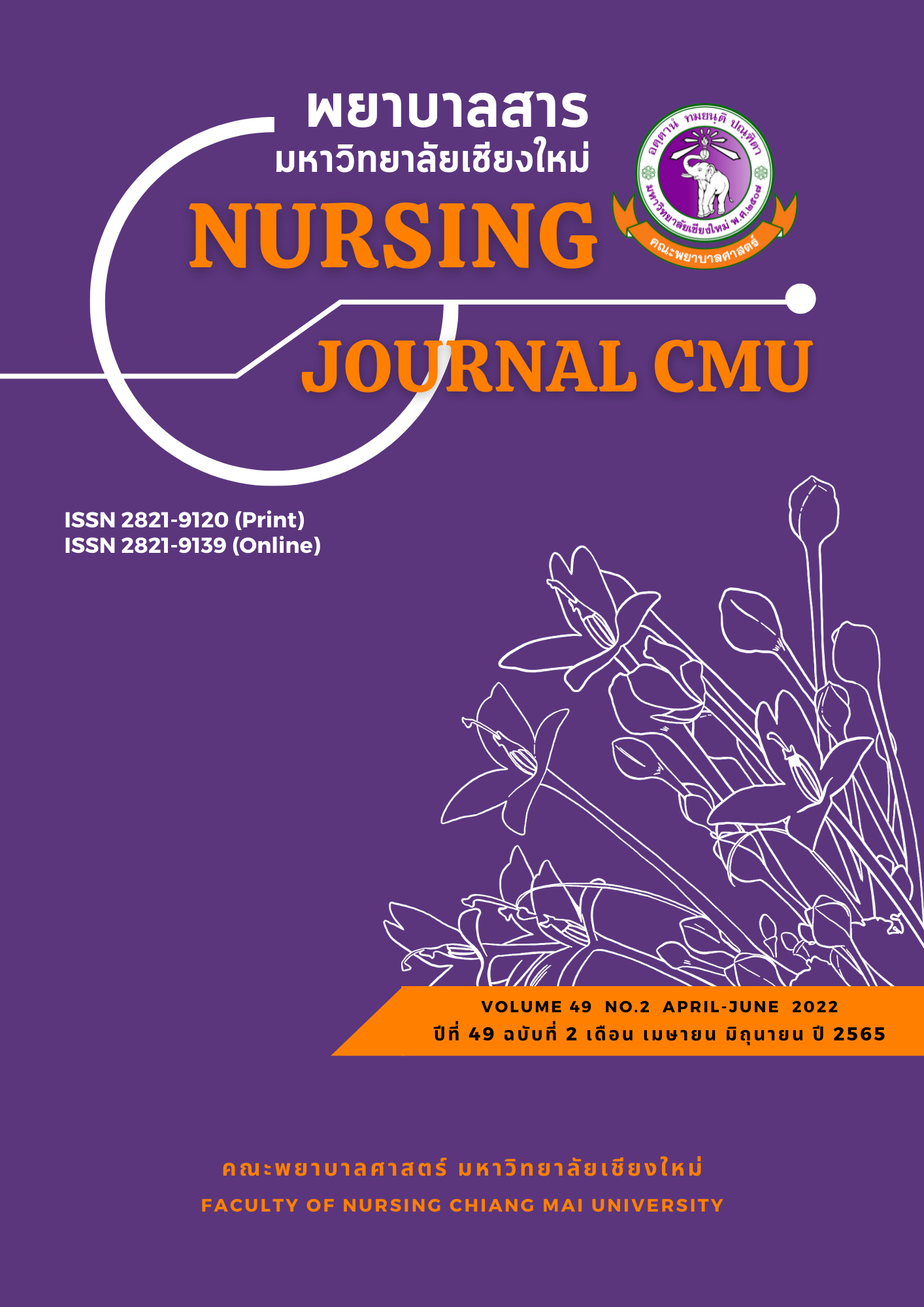การเสริมสร้างพลังอำนาจเชิงโครงสร้างและภาวะบีบคั้นทางจริยธรรมของพยาบาล ในโรงพยาบาลเอกชน
คำสำคัญ:
การเสริมสร้างพลังอำนาจเชิงโครงสร้าง, ภาวะบีบคั้นทางจริยธรรม, พยาบาลเอกชนบทคัดย่อ
การเสริมสร้างพลังอำนาจเชิงโครงสร้างเป็นปัจจัยหนึ่งที่ทำให้พยาบาลรับรู้สมรรถนะแห่งตนเอง สามารถควบคุมการทำงานและเผชิญกับสถานการณ์เชิงจริยธรรมได้ การวิจัยครั้งนี้มีวัตถุประสงค์เพื่อศึกษาการเสริมสร้างพลังอำนาจเชิงโครงสร้าง ภาวะบีบคั้นทางจริยธรรมของพยาบาลและความสัมพันธ์ของตัวแปรทั้งสอง กลุ่มตัวอย่างประกอบด้วยพยาบาลวิชาชีพที่ปฏิบัติงานในโรงพยาบาลเอกชน จังหวัดเชียงใหม่ 266 คน ใช้วิธีการสุ่มหลายขั้นตอน เครื่องมือวิจัย มี 3 ส่วนคือ 1) แบบสอบถามข้อมูลส่วนบุคคล 2) ภาวะบีบคั้นทางจริยธรรมของบุคลากรด้านด้านสุขภาพ (Moral Distress for Healthcare Professionals: MMD-HP) (Epstein, Whitehead, Prom- pahakul, Thacker & Hamric, 2019) และ3) สภาพการทำงานที่มีประสิทธิผล II (Laschinger et al., 2001 as cited in Laschinger, 2012) โดยแบบสอบถามส่วนที่สองและสามมีค่าความเชื่อมั่นเท่ากับ .96 และ .85 ตามลำดับ วิเคราะห์ข้อมูลด้วยใช้สถิติเชิงพรรณนา และสถิติ Spearman rank correlation analysis
ผลการวิจัยพบว่า กลุ่มตัวอย่างมีค่าเฉลี่ยภาวะบีบคั้นทางจริยธรรมอยู่ในระดับปานกลาง ( =74.96, SD =67.88) และรับรู้ว่าได้รับการเสริมสร้างพลังอำนาจเชิงโครงสร้างอยู่ในระดับปานกลาง ( = 22.58, SD = 3.50) นอกจากนี้ยังพบว่าการเสริมสร้างพลังอำนาจเชิงโครงสร้างมีความสัมพันธ์เชิงลบกับภาวะบีบคั้นทางจริยธรรมของพยาบาล (r = 0.148 , p-value = .016)
จากผลการศึกษานี้มีข้อเสนอว่าการเสริมสร้างพลังอำนาจเชิงโครงสร้างเป็นแนวทางหนึ่งในการลดภาวะบีบคั้นทางจริยธรรมของพยาบาลในโรงพยาบาลเอกชน ดังนั้นผู้บริหารทางการพยาบาลจึงควรวางโครงสร้างการทำงานที่ทำให้พยาบาลเกิดพลังอำนาจเพื่อสามารถจัดการกับสถานการณ์บีบคั้นทางจริยธรรมได้
เอกสารอ้างอิง
Burn, N., & Grove, S. K. (2005). The practice of nursing research: Conduct, critique & utilization (5thed.). Philadelphia: W. B. Saunders.
Boonkhaew, P., Rabob, C. & Vanakul, P., (2021). The Expectations of service recipient towards service quality in hospital front office department. UMT-Poly Journal, 18(2), 62-71.
De Villers, M. J., & DeVon, H. A. (2013). Moral distress and avoidance behavior in nurses working in critical care and noncritical care units. Nursing Ethics, 20(5), 589-603.
Department of Business Development, (2020). Hospital business and nursing home. (in Thai). Retrieved from https://www.dbd.go.th/download/document_file/Statisic/2562/T26/T26_ 201903.pdf.php.
Elpern, E. H., Covert, B., & Kleinpell, R. (2005). Moral distress of staff nurses in a medical intensive care unit. American Journal of Critical Care, 14(6), 523-530.
Epstein, E. G., Whitehead, P. B., Prompahakul, C., Thacker, L. R., & Hamric, A. B. (2019). Enhancing understanding of moral distress: The measure of moral distress for health care professionals. AJOB empirical bioethics, 10(2), 113-124.
Ganz, F. D., Raanan, O., Khalaila, R., Bennaroch, K., Scherman, S., Bruttin, M., ... Benbenishty, J. (2013). Moral distress and structural empowerment among a national sample of Israeli intensive care nurses. Journal of Advanced Nursing, 69(2), 415-424.
Hamric, A. B., Borchers, C. T., & Epstein, E. G. (2012). Development and testing of an instrument to measure moral distress in healthcare professionals. AJOB Primary Research, 3(2), 1-9.
Jalali, K., Tabari-Khomeiran, R., Asgari, F., Sedghi-Sabet, M., & Kazemnejad, E. (2019). Moral distress and related factors among emergency department nurses. Eurasian Journal of Emergency Medicine, 18(1), 23.
Laschinger, H. (2012). Conditions for work effectiveness questionnaire i and ii user manual.Retrieved from http://medpr.imp.lodz.pl/Adaptacja-Kwestionariusza-warunkow-efektywnosci-pracy-II-w-grupie-polskich-pielegniarek,89625,0,2.html
Ledoux, K. (2015). Moral distress: A study of personal and organizational factors. (Doctor of Philosophy Thesis). The University of Western Ontario: Canada.
Nuchpong, N. (2019). Factors predicting innovative behaviors of nurses in government university hospitals. (Master’s thesis). Chiang Mai University, Thailand. (in Thai)
Nunil, S.(2016). Governance in private organizations: Service sector business. Silpakorn University Journal, 36(2), 57-76. (in Thai)
Nursing Department. (2018). The role of nurse. Nonthaburi: Tawan media. (in Thai).
Ohnishi, K.,Ohgushi, Y., Nakano, M., Fujii, H., Tanaka, H., Kitaoka, K., ... Narita, Y. (2010). Moral distress experienced by psychiatric nurses in Japan. Nursing ethics, 17(6), 726-740.
Saenprasarn, P., Suthipong, N., Srihawech, T. & Chooha, U. (2017). Ethical decision-making in nursing care at high risk for ethical complaints of professional nurses in private hospitals. Kuakarun Journal of Nursing, 24(2), 113-129. (in Thai).
Sirilai, S.(2012). Ethics for nurses. (12thed.). Bangkok: Chulalongkorn University Printing House.(in Thai)
Srithammanit, T. & Chompuming, P. (2018). Effective human resource management of major private hospital network in Bangkok and Chiang Mai Province. Journal of Sakon Nakhon Hospital, 21(3), 118-128. (in Thai)
Sirintarangkoon, W. (2014). Moral distress of registered nurses in caring for psychiatric patients in psychiatric hospital, southern Thailand. (Master’s thesis). Prince of Songkla University, Thailand. (in Thai)
Songsraboon, R. (2014). Model of an excellent service of private hospitals in Thailand. Journal of Graduate School of Commerce Burapha Review, 2(9), 54-67. (in Thai)
Laschinger, H. K., Sabiston, J. A., & Kutszcher, L. (1997). Empowerment and staff nurse decision involvement in nursing work environments: Testing Kanter's theory of structural power in organizations. Research in Nursing & Health, 20(4), 341-352.
Thato R. (2018). Nursing research: Concepts to appication (3rd Ed.). Bangkok : Chulalongkorn University Printing House. (in Thai).
The Private Hospital Association Thailand. (2022). Nursing standards. Retrieved from https://www.tnmc.or.th/news/124. (in Thai)
Trotochaud, K., Coleman, J. R., Krawiecki, N., & McCracken, C. (2015). Moral distress in pediatric healthcare providers. Journal of Pediatric Nursing, 30(6), 908-914.
Vetayavetin, S. (2011). Relationships between empowerment, work itself, and work engagement of professional nurses, private hospitals. (Master’s thesis). Chulalongkorn University, Thailand. (in Thai)
Widianti, E., Arinda, R., & Prawesti, A. (2019). Nurses’ moral distress in the emergency department. Journal of Nursing Care, 2(3). doi:10.24198/jnc.v2i3.21374
ดาวน์โหลด
เผยแพร่แล้ว
รูปแบบการอ้างอิง
ฉบับ
ประเภทบทความ
สัญญาอนุญาต
ลิขสิทธิ์ (c) 2022 พยาบาลสาร

อนุญาตภายใต้เงื่อนไข Creative Commons Attribution-NonCommercial-NoDerivatives 4.0 International License.
บทความที่ได้รับการตีพิมพ์เป็นลิขสิทธิ์ของวารสารพยาบาลสาร
ข้อความที่ปรากฏในบทความแต่ละเรื่องในวารสารวิชาการเล่มนี้เป็นความคิดเห็นส่วนตัวของผู้เขียนแต่ละท่านไม่เกี่ยวข้องกับมหาวิทยาลัยเชียงใหม่ และคณาจารย์ท่านอื่นๆในมหาวิทยาลัยฯ แต่อย่างใด ความรับผิดชอบองค์ประกอบทั้งหมดของบทความแต่ละเรื่องเป็นของผู้เขียนแต่ละท่าน หากมีความผิดพลาดใด ๆ ผู้เขียนแต่ละท่านจะรับผิดชอบบทความของตนเองแต่ผู้เดียว






